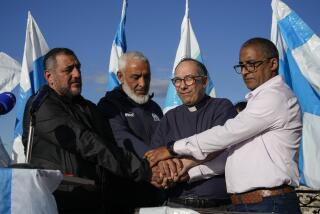Commentary : All Faiths Must Have No Isolating Boundaries
- Share via
More than the calendrical coincidence of Ramadan, Easter and Passover draws us together. We are all also brothers and sisters in Abraham.
Our father Abraham was summoned to be “a blessing to all the families of the Earth.”
We are his family and are mandated to be a blessing to each other. Between us we can allow no smallness of faith and no pettiness in our relationships. Allah, God, the Lord we worship knows no isolating borders, no parochial territories, no exclusive geography.
Passover is not for Jews alone. We are reminded of this around the Passover table when we read from the common narration, “In every generation every human being is to regard himself/herself as if they have gone out of Egypt themselves.”
People of every nation, every religion, every race, have their memories of persecution and darkness. Everyone of us has tasted our own bread of affliction.
Now we have all lived through a fierce war won by heroic men and women who risked their lives to defeat a sadistic and cynical tyranny. Still, the best of wars are tragic necessities. War is a tragic admission of human failure.
Even in triumph, especially in triumph, my tradition will not let me forget the terrible price of winning and those who perished on the other side.
On this Passover eve, as on every Passover eve, we lifted the cup of wine to recall the victory of innocence over the pursuing predators of Pharaoh. At the mention of each of the 10 plagues, the wine is spilled from a cup, so the cup of victory is not filled to the brim. We recall the great rabbinic legend of the angels who in their partisan glee sought to praise God for the victory at the parting of the Red Sea. The angels were chastised by the Creator and Redeemer of all: “My children drown in the sea and you dare sing songs?” The angels were silenced. Though our cause is just and the sacrifice of our soldiers noble, we are muted. As we are instructed in the book of Proverbs “If your enemy falls do not exult; if he trips, let your heart not rejoice.” (Proverbs 24:17)
There is no full-throated singing in the synagogue on the last days of the Passover. Certain festival psalms normally recited at other holidays are deleted on the Passover out of respect for the drowning of Pharaoh’s followers. Having witnessed the death of God’s children, who can sing the psalm that exults “when I was brought low God saved us,” or the verse that contrasts the impotence of the idols of the enemy with the power of God when so many lie buried in the desert dust?
How can we worship? By looking to the future.
We recall the evil edicts of Pharaoh and the complicity of those who followed his orders. But we also remember the daughter of Pharaoh who stretched out her hand to save the child Moses, and we honor the memory of two Egyptian midwives, Shifra and Puah, who saved Jewish infants from Pharaoh’s decree of death at the risk of their own lives.
Those memories are the patrimony of all our children, to celebrate their spiritual kinship and destiny. Out of the desert storm, peace; out of the darkness of misunderstanding, compassion; out of slavery, freedom; out of division, the prophecy of Isaiah: “Blessed be Egypt my people and Assyria the work of my hands and Israel Mine inheritance”. (Isaiah 19:24).
At this season of redemption we face each other with a spirit of hope and greetings of reconciliation. “Salam alakum,” peace unto you.
More to Read
Sign up for Essential California
The most important California stories and recommendations in your inbox every morning.
You may occasionally receive promotional content from the Los Angeles Times.













